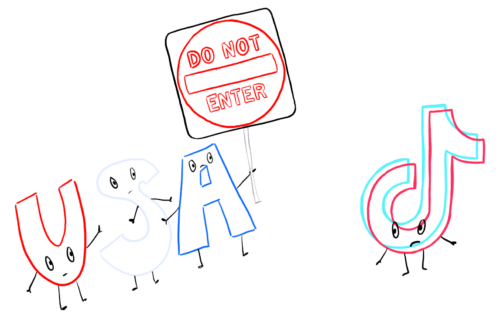It’s 11:30 p.m. on a Tuesday night. I have a 10:30 a.m. class on Wednesday, and I have just finished most of my readings for tomorrow’s classes. Satisfied with this work, I decide it’s time to hit the hay. I brush my teeth, put my retainer in, and crawl into bed. I put my blue light glasses on, open my phone, and click on TikTok. I tell myself: Just a couple of videos and then I’ll go to bed. This all-too-familiar story has an all-too-familiar ending: closing TikTok at 2 a.m. with heavy eyes and a mind buzzing with noise and regret.
Don’t get me wrong—I love TikTok. The ability to bounce from a new recipe to a helpful life hack to an undiscovered artist in a matter of minutes is phenomenal; it’s exactly why I would always redownload the app after deleting it.
Every couple of months, I do a deep dive into my phone’s screen time, and I am inevitably disappointed with my social media usage. After years of hearing about my parents’ extraordinary college experiences, I can’t help but question why I continue to waste so much of mine on this mindless app. As a result, I find myself going through the routine of deleting TikTok for a couple of months, then, at some point in my cleanse, inevitably finding myself bored enough to redownload it.
This is exactly why I was horrified to discover on Jan. 17 that I would no longer be able to redownload the app after my latest TikTok cleanse. Sure, I deleted the app every couple of months. But I also counted on it always being there when I was ready to return.
TikTok is a source of joy, connection, and inspiration. A place where anyone, regardless of fame or fortune, can go viral. It’s funny. It’s entertaining. It’s addictive. And that’s exactly the problem.
TikTok isn’t just another social media app—it’s a perfectly engineered attention trap. Compared to other platforms, TikTok’s algorithm keeps users scrolling for hours by inducing a “flow state.” A flow state, often experienced by competitive athletes and performers, is essentially a state of intense concentration and a loss of sense of time.
Due to its connection with the brain’s reward pathway, being in a flow state is a highly enjoyable experience. With regard to TikTok, users get quick dopamine hits when scrolling which helps enter them into a flow state. Once in this flow state, users begin to feel the associated time distortion, explaining how three hours pass during what feels like 20 minutes of mindless swiping.
It may seem that these three hours on TikTok have no harmful consequences—besides the unintentional passing of time. Unfortunately, this is not the case. One study found that time distortion increased problematic TikTok usage, while another study showed that TikTok’s algorithm makes the addiction more severe than other social media platforms. Although the flow state itself is associated with reward, the addictive nature of scrolling on TikTok renders its flow state more harmful than helpful.
Another unfortunate outcome of TikTok’s endless stream of short videos is a reduced attention span. We’ve all sat on our phones waiting in line for a coffee, while we were supposed to be listening to a lecture, or even going to the bathroom. Be honest: When was the last time you sat in silence and did nothing for 10 minutes? Our generation is chronically online, and TikTok only exacerbates this.
Our perpetual attachment to the internet provides a limitless source of information, and TikTok provides an environment for this information to be consumed faster than ever. While this flood of content is a fantastic way to stay connected and in the loop, it’s also a double-edged sword. TikTok’s vast expanse of helpful knowledge is also rife with misinformation that spreads just as quickly as the truth. One investigation even discovered that 20% of search results for prominent news topics contained misinformation.
Despite these flaws, TikTok retains many benefits. It fosters creativity by providing users with a platform on which they can express themselves through a variety of mediums. It builds inclusive communities by bringing people together through shared niche interests and creating spaces to feel seen and understood. Above all, the app captivates and constantly entertains.
Since deleting TikTok for the final time, I’ve noticed some slight but impactful improvements in my life. I wake up every morning and get right out of bed and every night, fall asleep shortly after getting back into bed. The instinct to open my phone upon any unoccupied moment has faded, and the free hour I have between classes has now become a productive one. Most importantly, I feel in control of my time instead of being dictated by an app that tick-tocks away my days.
I’m not saying I wouldn’t give into the temptation to redownload TikTok if I could. I’m certainly not saying TikTok has no appeal. But at what cost do we keep scrolling? For every new life hack or viral trend, there is an algorithm designed to keep us scrolling into oblivion, hours of our lives slipping away along with our attention span, and a feed filled with misinformation. TikTok has turned TikToxic, and it’s time to stop scrolling and start living in the real world.
Heidi Heffelfinger ’26 (heidiheffelfinger@college.harvard.edu) has been spending just as much time on Instagram Reels as she did on TikTok.

